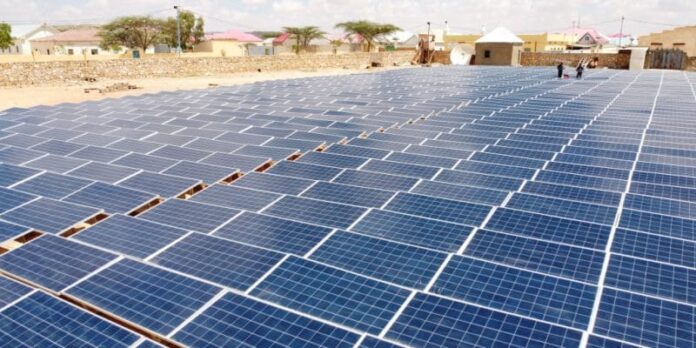OBI METU
Green Climate Fund (GCF) recently launched an emergency $80 million Energy Access Relief Fund (EARF) that shields clean energy companies in developing countries in Africa and Asia from COVID-19 economic shocks to keep low-carbon trajectories on track.
The EARF is a unique coalition of financial support for 90 companies in Africa and Asia that have been filling energy access gaps with low-carbon solutions but now face bankruptcy from the COVID-19 fallout.
GCF in a statement posted on its website, explained that the EARF, which aims to maintain the sector’s progress by bringing energy to all, will help keep these companies financially solvent by providing them with short-term loans.
The statement reads in part: “The launch of EARF today follows agreements by co-financers to support this financial fillip for developing countries by generating a green resilient recovery to COVID-19 while tackling the climate challenge. It represents a major step for GCF as an anchor investor to help overcome COVID-19 blockages in financing developing country climate action.”
An analysis of energy access companies eligible for relief funding across 50 countries shows that 77 per cent of potential borrowers require emergency financial assistance to stay afloat.
Climate Fund : GCF is the largest contributor to EARF, providing a $30 million investment. While the relief fund covers Africa and Asia, GCF funding is focused on maintaining mitigation momentum in nine sub-Saharan African (SSA) countries which face acute challenges in tackling climate change.
In sub-Saharan Africa, the Fund estimates that about 548 million people do not have access to electricity and instead rely on kerosene and diesel generators for lighting, thereby presenting family health and safety hazards.
Another 900 million (85 per cent of the population) lack access to clean cooking fuels and technologies, with the reliance on firewood by many leading to rapid deforestation, it added.
The Fund noted that broken supply chains, increased costs of solar components and continued COVID-19 lockdowns have crippled the energy access industry, which provides renewable energy solutions such as solar lanterns, household solar, mini-grids and modern energy cooking equipment to power-deficient customers.
“The EARF is a critical tool to help us build back better and tackle climate change. It will ensure that social enterprises can continue to provide renewable energy solutions and advance climate mitigation and resilience across sub-Saharan Africa and Asia,” said GCF Executive Director, Yannick Glemarec. “GCF is proud to be part of this innovative partnership, and delighted that it is moving ahead to launch.”
EARF is designed to provide up to 3 to 5-year tenure, subordinated, unsecured, low-cost and subsidized loans to viable companies that are facing liquidity challenges due to COVID-19.
The Fund intends to focus on the smaller to mid-sized energy access companies that are addressing the needs of the bottom of the pyramid consumers and expects to make about 90-100 loans. Its primary focus is expected to be on loans of less than $1million, within a range of $50K to $2.5million.
Fund applicants are evaluated against eligibility and underwriting criteria.
The EARF is a critical tool to help us build back better and tackle climate change. It will ensure that social enterprises can continue to provide renewable energy solutions and advance climate mitigation and resilience across sub-Saharan Africa and Asia.
EARF, managed by Social Investment Managers and Advisors (SIMA), is a partnership of 16 governments, foundations and investors. Through its support for energy access companies, it is expected to reduce 1.33 million tonnes of greenhouse gases over its four to six year lifetime, with estimated benefits to about 16 million people in the target countries.
In the last decade, energy access firms are said to have made remarkable progress in mitigating climate change and reaching people, businesses and social institutions with low carbon energy, especially those who are operating out of sub-Saharan Africa and many parts of Asia.
“But, that progress is now hindered and could possibly be reversed because of COVID-19 related disruptions. Even after 1.5 years after the onset of COVID, it has become evident that companies are facing problems because of intermittent lockdowns and its resultant economic fallout, and supply chain disruptions,” SIMA said on its website.
As a result, many companies are seeing reduced sales and collections, increasing cost of goods, limited cash reserves, and tightening funding resources, it added.
Commenting on the launch of EARF, the Founder/CEO, impact investor Acumen, a GCF Accredited Entity, Jacqueline Novogratz, said: “Access to clean, reliable and affordable energy is essential in lifting communities out of poverty. We could see that the pandemic was adversely impacting those who were most vulnerable, and that we needed to take action. We couldn’t do it alone—it would take all of us. The launch of the EARF illustrates the power of partnership and the moral imagination in a time of crisis.”
Accredited Entities – private or public, non-governmental, sub-national, national, regional or international, partner with GCF to implement projects by converting concepts into action, and help countries to develop project ideas, and submit funding proposals for the GCF Board to approve.
These Entities also help in the management and monitoring of projects and programmes. Countries may access GCF resources through multiple entities simultaneously.




















